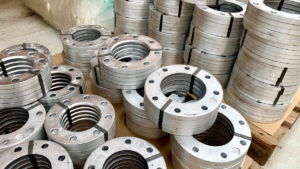In a world where environmental concerns are paramount, materials that offer sustainability and durability are in high demand. One such material that stands out in terms of both eco-friendliness and longevity is stainless steel. This versatile alloy has earned its place as a green material for a greener future. In this blog, we’ll explore the sustainable benefits of stainless steel and its positive impact on the environment.
Here at Special Metric Materials, we understand the importance of stainless steel and how the sustainability of this useful alloy is helping to shape the future of the UK.
We always ensure that we have a well-stocked warehouse of ISO stainless steel piping, fixtures and fittings in stock, including tube, elbows, pulled tees, reducers, end caps, pressed collars and backing flanges. All of these items are available for next-day delivery around the UK.
We source our stock from a variety of reputable stainless steel mills across Europe and our supply chain adheres to the highest level of quality and service. Because of our reputable supply chain, our expert team can also source specialist items and sizes so contact us today to discuss your requirements.

Stainless Steel: An Eco-Friendly Choice
- Recyclability:
One of the most significant sustainable benefits of stainless steel is its recyclability. Stainless steel is 100% recyclable, which means it can be reused without any loss of quality. In fact, stainless steel is one of the most recycled materials globally. The recycling process is energy-efficient and doesn’t produce significant waste or emissions, reducing the overall environmental footprint.
- Longevity:
Stainless steel is renowned for its durability and resistance to corrosion, making it a long-lasting material. Products made from stainless steel have a longer lifespan than those made from other materials, reducing the need for replacements and, consequently, the consumption of resources.
- Low Maintenance:
Stainless steel requires minimal maintenance, which translates to fewer cleaning and repair materials and less water and energy consumption. This low-maintenance characteristic contributes to the sustainability of stainless steel products, from kitchen appliances to industrial structures.
- Resistance to Rust and Corrosion:
Stainless steel’s corrosion resistance means that it can withstand harsh environments without deteriorating. This property is particularly valuable in marine and coastal applications, where other materials might succumb to rust. The extended lifespan of stainless steel in these settings reduces the need for constant replacements and repairs.
Stainless Steel in Eco-Friendly Applications
The sustainable advantages of stainless steel have led to its use in various eco-friendly applications:
- Renewable Energy:
Stainless steel plays a crucial role in renewable energy solutions like wind turbines and solar panels. Its resistance to corrosion ensures that these systems have a long and effective life span, making clean energy generation more sustainable.
- Water Conservation:
Stainless steel is the material of choice for water storage and distribution systems. Its resistance to corrosion and low maintenance requirements help maintain water quality while minimizing the need for repairs and replacements in water infrastructure.
- Transportation:
Stainless steel is used in the automotive and aerospace industries to reduce the weight of vehicles and aircraft, which can lead to improved fuel efficiency and reduced emissions. Lighter transportation options contribute to more sustainable travel and logistics.
Sustainable Building and Construction
Stainless steel has become an essential material in sustainable building and construction practices:
- Architectural Beauty and Durability:
Stainless steel provides a modern and sleek appearance, enhancing the aesthetics of green buildings and structures. Its long-term durability means that these designs will remain attractive without frequent refurbishments.
- Corrosion-Resistant Infrastructure:
Stainless steel is used in bridges, stadiums, and other public infrastructure. Its resistance to corrosion ensures the longevity of these structures, reducing maintenance and the need for replacements.
- Energy Efficiency:
Stainless steel is used in the insulation of buildings, contributing to energy efficiency. It can be used in HVAC systems and cladding, reducing energy consumption and greenhouse gas emissions.
The sustainability of stainless steel in the future
Stainless steel’s versatility, durability, and sustainability ensure that it will remain relevant and essential in the future. As industries continue to prioritize longevity, sustainability, and efficiency, stainless steel will continue to play a key role in meeting these objectives across a wide range of applications and sectors. Some of these include:
- Transportation: Stainless steel’s use in the automotive and aerospace industries, particularly in lightweight components, contributes to improved fuel efficiency and reduced emissions. As the world seeks more sustainable transportation solutions, stainless steel will play a role in making vehicles and aircraft more eco-friendly.
- Water Conservation: Stainless steel is integral to water storage and distribution systems. Its resistance to corrosion helps maintain water quality and minimizes the need for repairs and replacements in water infrastructure, contributing to water conservation efforts.
- Medical and Healthcare: Stainless steel’s hygienic properties, biocompatibility, and corrosion resistance are valuable in the medical and healthcare industries. It is used for surgical instruments, medical equipment, and the construction of hospitals and healthcare facilities.
- Industrial Applications: Stainless steel’s resistance to corrosion and heat makes it indispensable in various industrial applications, including the chemical, petrochemical, and food processing industries. Its role in ensuring product integrity and safety is unlikely to diminish.
- Energy Efficiency: Stainless steel is used in energy-efficient building components, such as HVAC systems and cladding, contributing to energy conservation and reduced greenhouse gas emissions.
The sustainable benefits of stainless steel make it an excellent choice for a wide range of applications in an era where environmental responsibility is paramount. From its recyclability to its resistance to corrosion and low maintenance requirements, stainless steel is a green material that supports a greener future.
As industries continue to prioritise sustainability and environmentally responsible practices, stainless steel’s role in shaping a more eco-friendly world is set to expand. Its contributions to renewable energy, water conservation, transportation efficiency, and sustainable construction practices demonstrate its commitment to a sustainable path forward, making it an essential player in the global effort to reduce the carbon footprint and promote a greener future.

